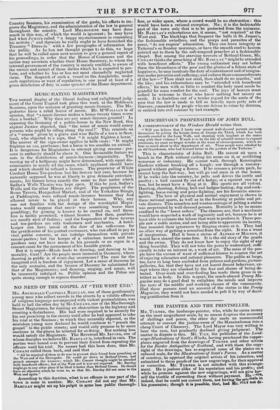NO NEED OF THE GOSPEL AT "THE WEST END."
MR. ARCHIBALD CAMPBELL B-ARCLA.Y, one of those gentlemanly young men who collect crowds in the streets by a voluble effusion of religious language accompanied with violent gesticulations, was held to bail the other day by Mr.CONANT, one of the Marlborough Street Magistrates, for causing an obstruction in the highway and creating a disturbance. His bail were required to be security for his not preaching in the streets until after he had appeared to take his trial at the Sessions ; to which they naturally objected, as the mistaken young man declared he would continue to "preach the gospel" in the public streets; and would only promise to be more cautious in the places he selected for so doing. But nothing less would satisfy the Magistrate. The Reverend Mr. IRVING, one of whose disciples we believe MT. BARCL AY is, interfered in vain. The parties were bound over to prevent their friend from repeating the offence until his trial. No sooner had this been done, than Mr. CONANT called them back, and said that
"All he required of them to do was to prevent their friend from preaching at the West end of the Metropolis. Ile could go down to Bethnal Green, and preach amongst the weavers ; which Mr. Conant thought might be attended with beneficent effects; but at the West end it was not required. Mr. Barclay might go to any other place if he liked it better than Bethnal Green. He should ihave no objection where he went to, so that Mr. Barclay did not come to the West end again."
According to this doctrine, what is an offence in one part of the town is none in another. Mr. Costars did not say that Mr. 13a.a.c.t.av might set up his pulpit in some less public thorough- fare, or wider space, where a crowd would be no obstruction : this would have been a rational exception. No; it is the fashionable part of the town only that is to be protected from the nuisance. Mr. BARCLAY'S exhortations are, it seems, "not required" at the West end. The blacklegs that frequent the hells in St. James's, the fashionable swindlers, and the pimps and parasites of the great, "do not require" admonition. They can learn integrity at Tattersal's on Sunday mornings, or have the smooth road to heaven pointed out to them by the soft-tongued preacher at a fashionable chapel. But among the starving weavers of Bethnal Green, Mr. CONANT thinks the preaching of Mr. BARCLAY " might be attended with beneficent effects." The young enthusiast may set before them the blessedness of the poor and the glories of a future state of happiness; he may inculcate the duty of contentment and of resigna- tion under privation and suffering; and enforce those commandments of the law—" Thou shalt not steal, thou shalt do no murder," and the like; and his exhortations may be "attended with beneficent effects," for men with so little to comfort the body must needs be grateful for some comfort for the soul. The joys of heaven must indeed be welcome to those who know nothing but misery on earth. It is doubtless out of a tender regard for the souls of the poor that the law is made to fall so heavily upon petty acts of thievery, committed by people who are driven to crime by distress, or enticed into evil courses by bad example.




















 Previous page
Previous page